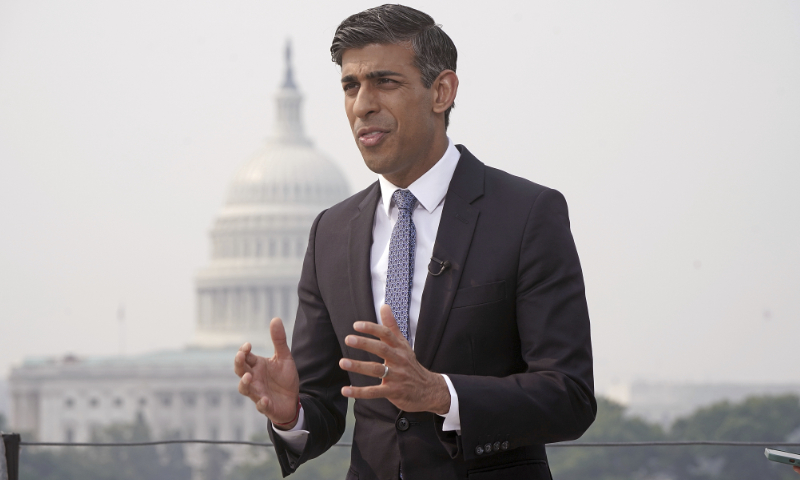British Prime Minister Rishi Sunak made his first official visit to the US from June 7 to 8. This visit, aimed at further promoting the special relationship between the UK and the US, has caused several third-party countries to feel targeted, involved, and even threatened, which is rare in contemporary international relations. The fact is that the negative geopolitical impact generated by the US-UK alliance, based on the Anglo-Saxon value, is far greater than the constructive aspects. When these two countries come together, it always gives the impression that they are planning something bad.
For example, one of the key topics discussed between Sunak and US President Joe Biden is the coordinated strengthening of sanctions against Russia. Sunak’s desire to seek the establishment of an “economic alliance” similar to a military alliance has raised concerns within the European Union. Since Brexit, the UK’s role as the US’ “Trojan horse” in Europe has sharply declined. Sunak’s visit also carries significant implications targeting China. Even many British citizens feel discontented and humiliated by Sunak’s overly submissive attitude toward Biden.
To be frank, the current state of British diplomacy cannot be solely attributed to Sunak. Compared to his predecessors, Liz Truss and Boris Johnson, Sunak’s attitude toward many international issues is relatively “pragmatic,” and he is not considered radical within the entire British political scene. Sunak’s primary task is to help the weakened British economy recover from its current predicament. The serious issue of inflation needs to be resolved, but so far, he doesn’t seem to have got a clear solution. The approach still relies on the UK’s strategic dependence, placing most of the bets on the US, which only increases Britain’s reliance on the US.
The decision-makers, when lack sufficient political acumen, courage, and imagination, will keep Britain spinning in a small circle. It can be foreseen that Sunak’s ambitious “UK-US economic alliance” will surely disappoint him. In terms of the UK-US relationship, there is already a significant imbalance, with the UK consistently being diminished and undervalued, and its bargaining power diminishing in the face of the US, which determines that the scope of achievements from his visit to the US will be very limited. As The Guardian suggested, the steering wheel is in the hands of Washington. However, there is another possibility: if Sunak can demonstrate autonomy and independence on certain issues, avoiding hyping up matters unrelated to the interests of the UK, it would undoubtedly bring a more proactive rather than passive approach to British diplomacy.
In the eyes of outside world, the UK has almost become a “European branch of the US,” as its statements and actions on various China-related issues align closely with Washington’s, and even appear more aggressive. Just a few days before Sunak’s visit to the US, the British side baselessly hyped up topics such as “overseas police stations” and “spy cameras” to smear China, which raises suspicions that it was done to provide an accompaniment for Sunak’s US visit. The strategic dependence on the US is manifested in its aggressiveness toward China, which is significantly at odds with British national interests. A recent European opinion poll showed that despite the US exerting pressure on Europe, the majority of respondents still view China as a “necessary partner,” which is the highest proportion among all options. And in the event of a conflict between China and the US over the Taiwan question, most respondents hope to maintain neutrality. This reflects the true sentiment in Europe and also requires the attention of 10 Downing Street.
According to reports, Sunak has drawn comparisons between economic cooperation and the victories achieved by the British and American forces on the battlefield. However, what has the “cooperation” between the US and the UK brought in places like Iraq, Afghanistan, Syria, and Ukraine since the end of the Cold War?
Now, Sunak is trying to push the old strategy of forming small cliques and engaging in confrontational blocs in the field of economy, and even establish a “military-like” economic alliance with the US. From any perspective, London is not just veering off course but actually going down the wrong path.
After Brexit, the UK may need time to find a way out in the face of challenges. However, this search should be rational rather than indulging in the old-day fantasy of the “Anglo-Saxon world” or obsessing over the ambition to become the “second in the West,” even at the cost of sacrificing diplomatic autonomy and independence. In other words, if there comes a day when dialogue with the US can replace direct engagement with the UK, then what value does British diplomacy hold? If the “special relationship” with the US is Downing Street’s only lifeline, then shouldn’t it also bear some of the blame for the problems created by Washington?
(Global Times)




